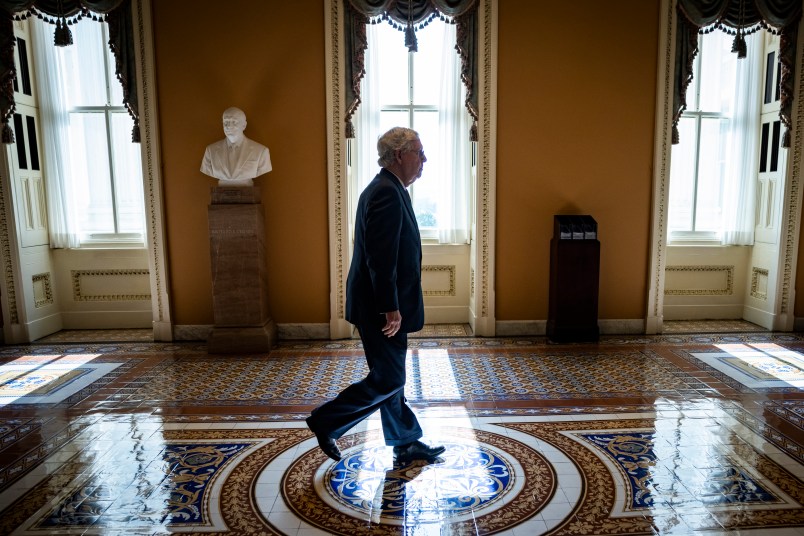Republicans filibustered the For The People Act Tuesday evening, blocking the bill from proceeding to debate on the Senate floor.
The final vote count was an even 50-50 split right down party lines, short of the 60 “yes” votes needed to overcome the filibuster.
“I want to be clear about what just happened on the Senate floor,” an impassioned Senate Majority Leader Chuck Schumer (D-NY) said after the vote failed. “Every single Senate Republican just voted against starting debate — starting debate — on legislation to protect Americans’ voting rights. Once again, the Senate Republican minority has launched a partisan blockade of a pressing issue here in the United States Senate, an issue no less fundamental than the right to vote.”
Senate Minority Leader Mitch McConnell (R-KY), who had aggressively whipped his members against the bill, spoke Tuesday shortly before the vote.
“By now, the rotten inner workings of this power grab have been thoroughly exposed to the light,” he said.
Republicans have been oriented against the bill for months; Sen. Ted Cruz (R-TX) conceded during a May markup committee hearing that even if Republican amendments were adopted, he still wouldn’t support it.
Passing the legislation has taken on increased importance to Democrats amid a nationwide push from GOP legislatures to pass restrictive voter laws in the wake of their 2020 losses. Many national Republicans have downplayed that burst of legislative activity, or disingenuously rebranded it as an effort to enhance election security.
The suspense surrounding Tuesday’s vote centered not on Republicans, all of whom were expected to oppose the bill, but on Democrats, who had to work to unify 50 votes in favor of proceeding to debate. It’s a sign of how delicate Democrats’ tightrope walk is that gathering all their members for a vote sure to fail was a noteworthy effort, and they still have a ways to go to pass the bill into law.
Sen. Joe Manchin (D-WV) sent Democrats into a despair spiral when he came out against the bill in one of his written reiterations of his refusal to reform or eliminate the filibuster. He revived hope last week when he released a memo of voting proposals he does support, citing provisions in both the For the People Act, which Democrats labeled Senate Bill 1, and the John Lewis Voting Rights Act. Democrats have been working to bring him on board to S.1 ever since.
Sen. Amy Klobuchar (D-MN) has been leading the effort, describing negotiations to reporters Tuesday as positive and ongoing.
Manchin released a statement Tuesday afternoon, after being trailed by reporters all day, indicating that he’d vote yes on a motion to proceed.
“Unfortunately, my Republican colleagues refused to allow debate of this legislation despite the reasonable changes made to focus the bill on the core issues facing our democracy,” Manchin said in a statement. He added, to the likely relief of those same Republicans, that he continued to be “committed to finding a bipartisan pathway forward because the future of our democracy is worth it.”
Democrats saw that yes vote as key to keeping him engaged — a precursor to their long game to sway him on the filibuster reform needed to pass the bill, and other components of President Joe Biden’s agenda, into law.
Of course, up against the solid wall of Republican opposition, Manchin isn’t the only Democratic senator causing the caucus headaches. Sen. Kyrsten Sinema (D-AZ) too is a staunch supporter of the filibuster, and doubled down on that position in a Monday op-ed.
Democrats acknowledged Tuesday that even if they did achieve their goal of a unified front in the face of the GOP filibuster, they’ll have to figure out if they can change those recalcitrant senators’ minds if they have any hope of passing the bill into law — an act many of them have equated to saving democracy from the state-level onslaught.
“We’ve got to find a way to pass voting rights and I’m deeply committed to that,” Sen. Raphael Warnock (D-GA) told reporters Tuesday. “No Senate rule is more important than the constitutional right to vote.”







The system is ridiculous. What would Mitch McConnell (if D) do?
Shorter GOP: ”Democracy is for chumps. Suck it, America!”
That’s too hard to conceive. I’m sure Mitch’s Mom thought so as well.
Are the R’s afraid they can’t win if they can’t cheat? Yes, yes they are.
Ya think Mitch? Your rotten inner workings have been exposed to light (again).
